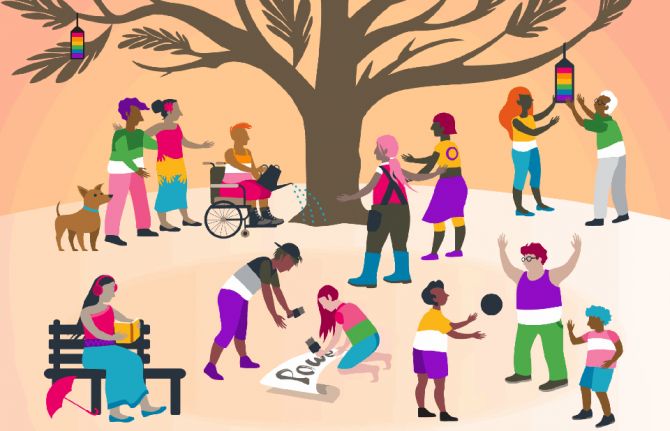

Press Statement
UNAIDS stands in solidarity with LGBTQI+ communities
16 May 2025 16 May 2025GENEVA, 16 May 2025–Ahead of International day against Homophobia, Biphobia and Transphobia (IDAHOBIT), May 17, UNAIDS stands in solidarity with LGBTQI+ communities.
Despite gains in the HIV response, LGBTQI+ communities continue to be left behind. While new HIV infections have dropped 35% among adults globally since 2010, they have risen by 11% among gay men and by 3% among trans people. Stigma, discrimination and criminalization, as well as restrictions on the ability for community organizations to form and operate act as barriers to accessing essential healthcare.
“We pay tribute to our colleagues who are part of the LGBTQI+ community,” said Winnie Byanyima, UNAIDS Executive Director. “We celebrate your courage, your authenticity, and your resilience even in the face of adversity for the community. We must continue supporting and promoting partnerships of LGBTQI+ movements with people living with HIV, women and girls and other key populations. In unity, communities can find the power to disrupt injustice and drive the changes that are required to end AIDS.”
Organizations led by gay men and other men who have sex with men have increasingly come under threat due to new or strengthened repressive laws, harmful policing practices, violence and a shrinking civic space. Research has found that HIV prevalence among gay men and other men who have sex with men is ten times higher in countries where there are legal barriers to civil society groups operating.
Recent cuts in aid funding have also had a devastating impact on community-led organizations, undermining their ability to provide healthcare, peer-led outreach and defending their rights.
"Threats to the lives and dignity of LGBTI people are escalating worldwide and cuts to foreign and development aid, as well as rollbacks in diversity, equity and inclusion policies, are only making it worse — especially for our communities,” said Julia Ehrt, ILGA World Executive Director. “Every day, we see projects and organizations to advance safety, well-being, and dignity being shut down.”
The 2025 IDAHOBIT theme “The Power of Communities” celebrates the power of collective action, highlighting that communities have been the driving force for progress not just for LGBTQI+ people, but for everyone. In the HIV response, community organizations play a critical role in the HIV response because they are trusted by their peers, able to reach the most marginalized people and groups and can deliver services based on people’s needs.
They also provide critical data to improve policies and advocate politically for access to services and to end stigma and discrimination.
UNAIDS fears that the growing pressure and attacks on communities combined with huge financial cuts from international donors will have catastrophic consequences on the HIV response. The loss of peer-led services will lead to higher levels of stigma and discrimination, creating even more barriers to life-saving prevention, testing and treatment.
Activism and the work of communities have driven the HIV response for decades. UNAIDS affirms that access to health is a right for all. A community-led HIV response is essential to end AIDS as a public health threat by 2030.
UNAIDS
The Joint United Nations Programme on HIV/AIDS (UNAIDS) leads and inspires the world to achieve its shared vision of zero new HIV infections, zero discrimination and zero AIDS-related deaths. UNAIDS unites the efforts of 11 UN organizations—UNHCR, UNICEF, WFP, UNDP, UNFPA, UNODC, UN Women, ILO, UNESCO, WHO and the World Bank—and works closely with global and national partners towards ending the AIDS epidemic by 2030 as part of the Sustainable Development Goals. Learn more at unaids.org and connect with us on Facebook, Twitter, Instagram and YouTube.

